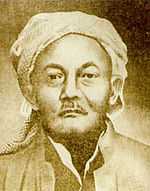Hasyim Asy'ari
| Hasyim Asy'ari | |
|---|---|
 Hasyim Asy'ari | |
| Born |
Muhammad Hasyim February 14, 1871 Demak, Dutch East Indies |
| Died |
July 25, 1947 (aged 72) Jombang, East Java |
| Nationality | Indonesian |
| Occupation | ulama |
| Known for | Rais 'Aam Nahdlatul Ulama |
Hadratusy Syaikh KH.Hasyim Asy'ari (February 14, 1871 – July 25, 1947) was an Indonesian ulama and founder of Nahdatul Ulama.
Biography
Hasyim Asy'ari was born Muhammad Hasyim in Gedang, Jombang Regency on February 14, 1871. His parents were Asy'ari and Halimah. His grandfather, Kiai Usman was the founder of Pesantren Gedang and his great grandfather was the founder of Pesantren Tambakberas. He was the third son of ten siblings.[1]
Hasyim Asy'ari's ancestry can be traced to Sultan Joko Tingkir (Hadiwijaya) of Pajang, and further, to Brawijaya VI (Girindrawardhana), the last king of Majapahit.
At the age of twenty, he married Khadijah, daughter of Pesantren Siwalan Panji leader. One year later, they went to Mecca. After seven months, his wife was dead and also his son, Abdullah two months later.[2]
In 1899, he founded Pesantren Tebuireng, which later became the largest pesantren in Java in early 20th century. The pesantren was also became the center for the reform of traditional Islamic teaching.[3]
On January 31, 1926 he and several traditional Islamic leaders founded Nahdatul Ulama (Awakening of Ulama). In Japanese occupation era, he was arrested, several months later he was released and became Head of Religious Affairs.[3]
He died on July 25, 1947 cause of hypertension after hearing news that Dutch troops was winning a battle in Malang.[4]
Personal life
He married seven times and all of his wives were daughters of ulama. Four of his wives were Khadijah, Nafisah, Nafiqah and Masrurah. One of his son, Wahid Hasyim was one of Jakarta Charter formulator and later became Minister of Religious Affair,[5] while his grandson Abdurrahman Wahid became President of Indonesia.
References
Bibliography
- Khuluq, Lathiful (2008). Fajar Kebangunan Ulama: Biografi K.H. Hasyim Asy'ari. Yogyakarta: LKiS Yogyakarta. ISBN 978-979-8966-37-8.